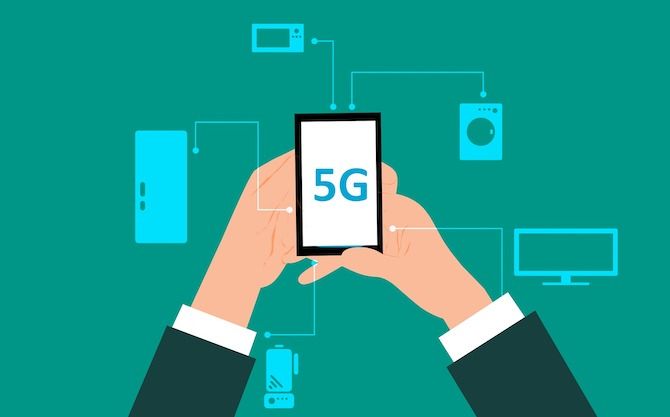Smartphones have changed the way we interact with the internet. Our cell networks have evolved over the years to keep up with our increasing demand, and 5G is the latest iteration of mobile internet.
Now that 5G networks are coming online, there has been speculation about the safety of the technology. You may have even heard some of these claims. So, it's time to find out, is 5G safe?
What Is 5G?
In most homes, connections to the internet are usually made via Wi-Fi. This is common across offices, and even coffee shops and public spaces like shopping malls. Outside of those areas, the cellular networks operated by AT&T, Verizon, and similar providers connect us to the internet.
There have been technological developments to improve mobile internet speeds, reliability, and coverage to support the increase of internet-connected devices. One of the most significant developments came in the form of 4G and LTE, which allowed us to use our smartphones to stream music, video call, and even watch Netflix while on the go.
5G represents the evolution of cellular networks to handle the coming influx of devices. The technology promises broadband-like speeds while out and about, as well as supporting the future of the internet of Things (IoT) devices. These are just the headlines, though; there are many ways that 5G will make mobile internet faster.
Is 5G Dangerous?
In 2019, there was a public debate about whether Huawei should be able to operate 5G networks. This may have made you concerned whether 5G is a security risk. It's also possible that you've heard about some of the health concerns raised about the network, too. During the COVID-19 pandemic, 5G was wrongly implicated in spreading the disease, for example.
There are some extreme claims about the health impact of 5G networks and technologies. However, despite media coverage of such claims, there is no evidence to suggest that 5G is dangerous to your health. As the New York Times noted, many of the same issues were raised about 4G, too.
Similarly to those older technologies, there is no evidence that 5G networks are dangerous. Initial studies have shown that the amounts of radiation generated by 5G cell towers and 5G smartphones are well below official safety limits.
In March 2020, The Guardian recounted statements by The International Commission on Non-Ionizing Radiation Protection (ICNIRP), noting that 5G is safe, while the risk posed is no different from other wireless networks.
It is reasonable, though, to still be cautious---after all, absence of evidence is not evidence of absence. That's why governments around the world keep the situation under review.
One complication is that scientific studies produce different results from one another. Study A may show no negative impact, while Study B shows a small possible impact. In this example, Study A would not be widely reported---it's not very interesting to say nothing happened---but Study B would likely receive a fair amount of media coverage.
The Scientific Method
The Scientific Method exists to deal with inconsistent results. This is a method of inquiry used by researchers, where data is observed without bias or assumption, as much as possible. In this scenario, someone has a question and sets about trying to answer it by developing a test and generating data.
The researchers then draw conclusions from the data. Once written up, the study is peer-reviewed, and, if found to be without error, will be accepted into a scientific journal for publication. This allows for public scrutiny of the study and the conclusions that were drawn from it.
Other scientists may ask the same or similar question, but have a different method of testing. This will likely give different results, too. Because of this, there could be a situation where two studies, broadly examining the same topic, give different results.
To combat this, scientists and governments look for consensus on a given issue. However, an agreement can be challenging to achieve. For example, two opinion articles in Scientific American exposed differing views on the safety of 5G.
Published first, an article by Joel M. Moscowitz makes the arguement that 5G is unsafe. At the same time, a follow-up piece by David Robert Grimes contends that personal idealogy and low-quality studies guide Moscowitz's argument.
Is 5G Safe?
The British telecoms regulator, Ofcom, performed one of the country's first studies into 5G networks. They took measurements at 16 locations in 10 UK cities. As reported by the BBC, their results showed that the maximum radiation output was 0.039 percent of official safety limits.
Scientific consensus is based on the data we currently have. So, of course, this may change in the future.
Studies into 5G are presently limited as the technology is still being rolled out. There are low numbers of users and compatible phones, too. As 5G becomes widely available, there will be more opportunities for studies and, importantly, long-term research into wireless technologies.
Based on our current understanding, though, 5G does not pose a risk to human health.
Wireless Networks and Cancer
One of the long-standing claims about the new network is that 5G may cause cancer, so it's worth taking a look at this particular assertion.
Cancer is the uncontrollable growth of our body's cells. Our DNA contains instructions on how the cell should behave, and control the growth of the cell, too. If there is a change, or mutation, to these structures, then the instructions become incorrect, leading to abnormal growth and multiplication of cells.
Radiation can damage cells, leading to these mutations. There are multiple types and strengths of radiation. If the radiation has enough energy, it is able to interact with atoms, and detach electrons. This is ionizing radiation and is considered the most dangerous to humans. Despite the damage it can inflict, ionizing radiation is also used in cancer radiotherapy treatment.
Low-energy, non-ionizing radiation is not able to interact with atoms, and, as a result, our cells. Wireless technologies, like Wi-Fi, radio, and LTE, fall into this category. That is true of 5G, as well. However, since the introduction of mobile phones in the 1990s, there have been suggestions that the non-ionizing radiation emitted by these wireless devices can harm us.
Does 5G Cause Cancer?
The World Health Organization's (WHO) 2014 guidance states that a "...large number of studies have been performed over the last two decades to assess whether mobile phones pose a potential health risk. To date, no adverse health effects have been established as being caused by mobile phone use."
While this type of non-ionization radiation may not directly cause mutations, there have also been studies into the other effects of wireless radiofrequency radiation. For example, this low-energy radiofrequency radiation can cause increases in temperature. However, investigations into this effect have also shown there are no impacts to your health as a result.
Such was the case in Australia. As reported by ZDNet, network operators found that 5G networks were no more harmful than other household items like baby monitors and microwaves.
Is 5G the Future?
While it's worth being cautious around new technologies, there's no evidence to suggest that 5G is any more dangerous than 4G, Wi-Fi, or any other existing wireless systems. Even then, the impact of such networks is debatable, with most studies concluding there is insufficient evidence to report them as unsafe.
If you're ready to dive into the mobile network of the future, then you'll need a phone that supports it. So, be sure to check out the best 5G smartphones before you make your next upgrade.




